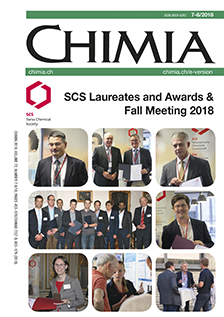Advancing Computational Approaches for Study and Design in Catalysis
DOI:
https://doi.org/10.2533/chimia.2018.508Keywords:
Catalysis, In silico design, Molecular dynamics, Solvent effects, Transition metals, Water splittingAbstract
Our group deals with the development of computational methods and their application to complex systems and processes. Emphasis is laid on accurate approaches derived from quantum mechanics, which we have used to investigate challenging questions in an interdisciplinary field encompassing chemistry, biology, physics, and materials science. In this review, we describe our recent activities for advancing computational approaches in catalysis. Moreover, our work for the study and design of catalysts for solar light-driven water splitting is summarized. The latter is a promising approach to face the world's increasing demand for sustainable energy storage and conversion. Emphasis is put on forefront methods for highly accurate electronic structure, sophisticated inclusion of environmental and dynamic effects and the derivation of structure–activity relationships for informed in silico design. This paves the way for the development of more efficient catalysts in close collaboration with experimental groups.Downloads
Published
2018-08-22
Issue
Section
Scientific Articles
License
Copyright (c) 2018 Swiss Chemical Society

This work is licensed under a Creative Commons Attribution-NonCommercial 4.0 International License.
How to Cite
[1]
Chimia 2018, 72, 508, DOI: 10.2533/chimia.2018.508.







